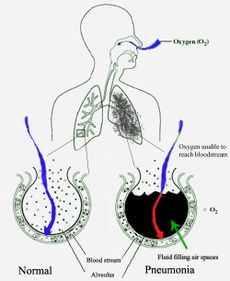As its name suggests,
Mycoplasma pneumoniae is a common cause of pneumonia in humans. Pneumonia
is a condition in which fluid like material fills the air sacs of the lungs
(alveoli) and prevents gas exchange between outside air and blood. Pneumonias
caused by the M. pneumoniae bacterium are often referred to as primary
atypical pneumonia or walking pneumonia. Primary atypical pneumonia is usually
a less severe form of pneumonia and infections not requiring medical attention are common. In addition to pneumonia, M. pneumoniae infection
can lead to pharyengitis and bronchitis.
attention are common. In addition to pneumonia, M. pneumoniae infection
can lead to pharyengitis and bronchitis.
M. pneumoniae is responsible for just twenty percent of pneumonias. Other causes of pneumonia are other types of bacteria, fungi, and viruses. Bacterial pneumonias are the most common type, with about half a million cases a year in the United States. Non-Mycoplasmal types of bacteria that cause pneumonia include Chlamydia, Legionella, and Streptococcus.
General Diagram of pneumonia's effect on the lungs